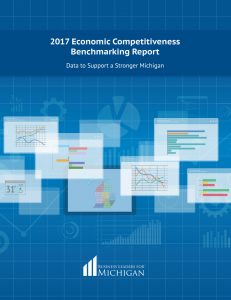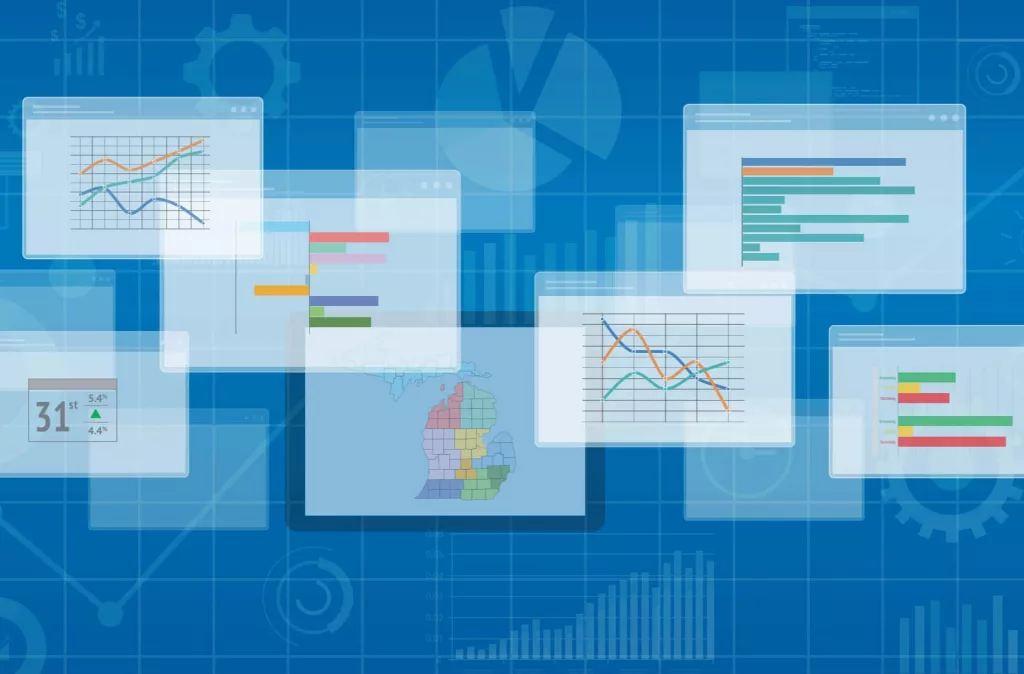Change continues to move at a breakneck pace around the globe, but unlike the not too distant past, Michigan isn’t necessarily being left in the dust among that change. Nevertheless, the Great Lakes State still has work to do in its drive to return to Top Ten status on multiple fronts and can’t quit the progress made now.
Earlier this month, nearly 500 business executives, nonprofit and community leaders, and policymakers met at the sixth annual Michigan CEO Summit to discuss what it takes to succeed and prosper today, both as individual enterprises and as a state.
Event participants also received an advance preview of the latest economic benchmarking report issued by Business Leaders for Michigan (BLM), which shows the state heading in the right direction relative to most economic indicators.
Doug Rothwell is President and CEO of Business Leaders for Michigan. He tells us, “One of the themes running through the discussions has been the breakneck pace of change.” Rothwell contends, “Shifting technologies, globalization, and a host of other factors require today’s business leaders to be forward-thinking, highly adaptable, and capable of making lightning-quick decisions.”
Rothwell says this year’s statewide economic benchmarking report shows Michigan leaders in all sectors have largely met the challenge of addressing 21st-century demands.
He says, “Jobs, income and productivity continue to make substantial gains—and that’s certainly no accident.” However, Rothwell notes, “While we have a long way to go in absolute terms, our progress is unmistakable and gives us every reason to expect we’ll be able to overcome our remaining challenges. What’s needed now are collaboration, consistency, and competitive backbone.”
BLM’s 2017 Economic Competitiveness Benchmarking Report tells the story of a state that is recovering faster than most other states, but has more ground to make up. Michigan’s tax climate has flipped from one of the nation’s worst to one of the best, and the state ranks very favorably in terms of the total cost of doing business. Michigan is a national leader in terms of R&D and exports, but there is still a great deal to accomplish in the areas of talent development and fiscal stability.
As Rothwell points out, “We’ve made huge strides since 2009, but we still have more work to do.” He adds, “If Michigan was performing like a ‘Top Ten’ state today, there would be 34,000 more Michigan people working, $9,500 more income per person, and $11,700 more GDP per person. These numbers reflect a strong imperative to accelerate the pace of change.”
Some of the key findings in the updated benchmark report include:
- The improvement in Michigan’s annual unemployment rate has been dramatic, dropping nearly 9-percentage points from 13.8-percent (50th) in 2009 to 5.0-percent (30th) in 2016. However, Michigan’s labor force participation rate, while improved over the last year, remains below the “Top Ten” and peer state averages.
- Michigan per capita personal income growth has outpaced the average of “Top Ten” states in each of the last two years, but at $44,347 Michigan’s 2016 per capita personal income was over $4,000 less than the peer average and over $9,500 less than “Top Ten” states.
- At $38,994, Michigan’s per capita GDP level earned a ranking of 33rd in the U.S.
- Michigan has had five straight years of either zero or positive population growth, but during that same period, peer and “Top Ten” states have grown as much as 10 times faster.
Also, in 2016, Michigan ranked:
- 8th and 12th, respectively, for Corporate and Overall Business Tax Climates.
- 25th for Business Climate Rankings, up 25 spots since 2009.
- 28th and 37th, respectively, for unfunded pension and OPEB liabilities.
- 46th for 4th grade reading proficiency.
- 42nd for students enrolled in Career and Technical Education classes.
- 30th for the percentage of working age adults with an Associate’s degree or higher.
Following the early November CEO Summit, Rothwell said, “Today’s discussions reveal a business community that’s strongly motivated and ready to tackle Michigan’s economic and social challenges.”
David N. Farr, chairman of the National Association of Manufacturers and chairman/CEO of electronics giant Emerson, keynoted that day’s event. During David Farr’s 16-plus years leading Emerson, the company has steadily transformed from a diversified manufacturing conglomerate into a highly focused global enterprise.
Also keynoting was Brian Walker, president and CEO of Herman Miller, Inc., who spoke about ways in which the future of the office also represents the future of Michigan businesses.
Rothwell summarized the day, saying, “Our keynote presentations were incredible, and ensured that all Summit participants are going home with new strategies in their pockets.” He added, “Today’s ideas will help them not only grow their own bottom lines, but also offer a collective way forward for all of us who want Michigan to be a power player on a global scale.”
The one-day event was held at the Westin Book Cadillac in Detroit.
Here is a link to Rothwell’s full report released following the conference in Detroit:







